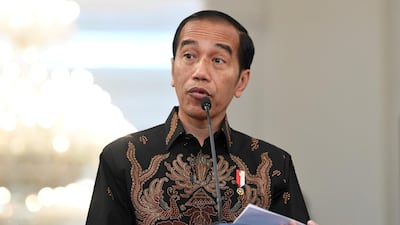Spring is already in the air in Jakarta. This is not a result of the balmy temperatures the city enjoys at this time of year, but because the entire focus of the political class is on the next election, to be held in April 2019. Everything, from the president’s recent referencing of a popular television show to his response to Australia's controversial comments on Jerusalem, is being viewed through the lens of the forthcoming vote.
For Indonesia, of course, next year's election will be pivotal. When he was elected in 2014, Joko Widodo became the first Indonesian leader since independence not to come from a military background. But the nation's politics also matter far beyond its shores. As the biggest Muslim country, and a democracy with a syncretic Islamic culture, the way it manages the demands and pressures of its diverse communities provides lessons for others.
Mr Widodo remains broadly popular as president and is expected to win next year. The selection of his vice-presidential running mate has been seen for months as a barometer of where the country's politics are heading. Mr Widodo’s choice, announced in August, of a controversial religious cleric, who was instrumental in bringing down one of the favourite contenders for the position, has been viewed as a courting of the religious vote and a sign of a conservative turn in the corridors of power. As always, though, the reality is somewhat more complicated.
Who Mr Widodo's running mate would turn out to be has been a cause of heated debate, public protest and legal procedures for at least two years. The current vice-president, Jusuf Kalla, had already served one term in the 2000s. However, his supporters fought a court battle to argue that the Indonesian constitution’s bar on anyone serving more than two terms in office only applied to terms that have run consecutively. This summer, the petition was struck down and Mr Kalla graciously agreed to step aside.
That, however, was something of a sideshow. Mr Widodo’s running mate was long expected to be the former governor of Jakarta, Basuki Tjahaja Purnama, popularly known as Ahok. Ahok is a Christian from the Chinese minority, who served as deputy to Mr Widodo when he was governor of the capital. A presidential ticket with both of them on it would have been seen as proof of Indonesia's pluralism.
In 2016, however, Ahok was accused of blasphemy for appearing to criticise a verse from the Quran. He apologised, insisting his words had been taken out of context and that he was only criticising the way the verse was used by his opponents. Regardless, the damage was done, and those same opponents, who had previously failed to generate much ill will against him, brought first tens and then hundreds of thousands on to the streets. A formal blasphemy charge followed and in 2017 Ahok was jailed for two years. It was reported last week that he will be released in January, too late for a political rehabilitation before the election.
Now comes the twist. One of the figures who did the most to attack Ahok was Ma'ruf Amin, the head of the Indonesia Ulema Council (MUI), the country's highest clerical authority – and the man Mr Widodo has just picked as his running mate.
Mr Amin was head of the MUI in 2016, when it issued a fatwa stating that Ahok was a blasphemer. That decision marked the moment when the protests against Ahok, which had previously been confined to a religious fringe, entered the mainstream.
Mr Widodo's decision to run alongside Mr Amin has naturally been seen as evidence of a likely increase in the influence of religious groups. However, Mr Widodo is widely disliked among religious conservatives and those nostalgic for the perceived stability of the Suharto era, which lasted from 1968 to 1998. Next year, Mr Widodo's opponent will be Prabowo Subianto, a former commander in the Indonesian army often preferred by religious conservatives.
A tendency in favour of mixing faith and politics is on the rise among Indonesians. However, while groups such as the 212 Movement – a coalition of hardline religious organisations that led the charge against Ahok – can feel the wind in their sails, there is no stable, organised Islamist faction. Still, candidates backed by conservative groups did well in local elections this year. By choosing Mr Amin, Mr Widodo may be hoping to split the conservative vote and diminish the of such groups.
Mr Amin is, after all, both part of the religious establishment and a man who has spent years working within the current political system. He may espouse occasionally conservative positions – such as speaking in favour of a greater role for sharia law – but Mr Widodo may see that as a price worth paying in order to sideline more problematic elements.
Torn between a former military commander on one side and a vice-presidential candidate who is a respected cleric on the other, conservative voters will likely split, weakening their power over the next president. By half-turning towards religious conservatives before the election, Mr Widodo may be preparing to swiftly distance himself from them after it.


